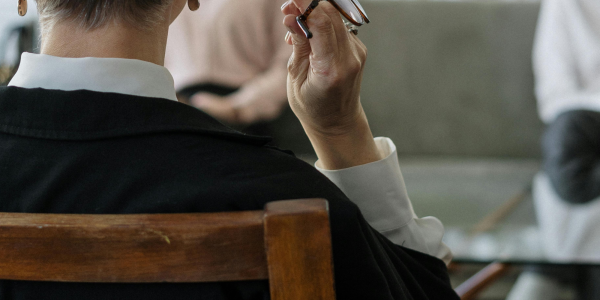With support from an ACLS fellowship, aspiring therapist and philosopher Anya Plutynski investigates the human bond at the heart of supporting mental health.

Captivated by the way we make sense of the natural world, Anya Plutynski began her career exploring the history and philosophy of evolutionary biology. But her own world shifted a decade ago when she was diagnosed with breast cancer. That life-changing experience sent her down a new path — one that led to her book, “Explaining Cancer: Finding Order in Disorder,” a reflection on how society understands illness itself.
Now, Plutynski is turning her attention to another subject that touches countless lives: mental health. In spring 2025, she was awarded a fellowship from the American Council of Learned Societies (ACLS). With that support, she’s focusing on her next book, “Making Mental Health,” which draws on her experience as a researcher and a therapist.
Plutynski spoke with the Ampersand about the history of psychotherapy, the shifting definitions of mental health, and why the relationship between therapist and patient may be the most important factor of all.
Looking back at your experience writing “Explaining Cancer,” how does that journey compare to working on “Making Mental Health”?
This book feels far more personal than my previous one. The cancer book was written for a philosophical, academic audience. This book is different in that I’m drawing upon my work as a therapist and my own personal experiences. For instance, while writing about grief, I drew on my experience of my mother’s Alzheimer’s. Because the loss through Alzheimer’s is such an extended process, I’ve started to wonder about what it means to grieve, and how we grieve. I also began to wonder whether what we often label as depression or anxiety is, at its core, grief — grief not only for lost loved ones, but also for the past, for times and places we miss, or for things we wished for.
What inspired this project?
I have been drawn to the field of mental health over the past few years. At first, I sat quietly in therapy courses as an observer, but before long, I realized I wanted to go further, training to become a therapist myself. So, I’m writing from two voices: as a historian and philosopher of science, and a therapist in training. Two big questions in philosophy of science have been how we demarcate science from pseudoscience and whether or how values play a role in science. These are the kinds of things I’ve been thinking about for decades, mostly in biology. This project is a new application of some of these same questions.
What questions are you exploring?
I want to know what evidence we have that psychotherapy works, what it means when it works, and how we know. Half of my book will be an old-school history and philosophy of therapy; the debates over effectiveness go back to Sigmund Freud. With each new psychotherapeutic modality, advocates distance themselves from the past by identifying their method as “evidence-based” and the old as unscientific. Yet, many of the same methods are deployed by different approaches.
What have you learned so far?
Though there are many therapeutic strategies and methods, the most important thing seems to be the relationship between therapist and client. There’s something about being with another person that is healing, and that’s what I want to explore. Part of the book will ask this big question: how and why being in a relationship with another person is so important to mental health.
How has our understanding of mental health changed over time?
In the early 20th century in the U.S., the conversation centered on “mental hygiene” rather than “mental health.” Mental hygiene referred to promoting traits for being a good citizen: adapting to difficulty, being self-reliant, emotionally stable, in service of holding a steady job. That framing shifted over the 20th century, with a significant transformation around 1980 with the DSM-III. From then, mental health came to mean the absence of a diagnosable disorder, rather than broader integration and well-being.
Why is mental health an important topic at this moment?
There’s been a huge increase in therapy use in the U.S. since 2020. Spending rose 65% between 2018 and 2021, from $30.8 billion to $51 billion. If we are going to therapists for help, it’s important to understand if they are helping and what they are helping with. Therapists don’t help with just one thing. Helping a child with autism is very different from helping an adult with anxiety or grief.
What does the evidence tell us about the efficacy of therapy?
In evidence-based medicine, randomized clinical trials are held up as the gold standard, with other evidence ranked below. But trial design is more complicated than it appears. What counts as a control, for instance, is not simple. We tend to accept the trial’s authority because that’s how we’re taught to think about science. Yet in psychotherapy, the story is more nuanced. More training, more degrees, even decades of experience don’t reliably predict which therapists achieve better outcomes. I’m not saying we shouldn’t use trials to study clinical modalities, but we also need to understand why some therapists are simply better. The answer often lies in the relationship. What really matters is whether the therapist and patient can build a strong working alliance. And because every patient is different, the “best” therapist isn’t the same for everyone.
Thinking broadly about mental health in the U.S., what do you wish for the future?
I would like greater access to psychotherapy for more people who are suffering. Many have limited access and could benefit. I also hope the therapeutic community — those training and licensing therapists — reflect more deeply on what it means to do psychotherapy well. A common view is that therapy’s goal is simply to alleviate symptoms, and effective care is whatever does this most efficiently. But this picture represents patients as passive sufferers, psychotherapists as offering instruments, and emotions as things to be gotten rid of. My view is that the best care encourages the opposite: therapists scaffold the patient’s active participation by encouraging expression of difficult emotions like sadness and fear. In the U.S., vulnerability is often seen as shameful, but expressing feelings honestly can take courage.





